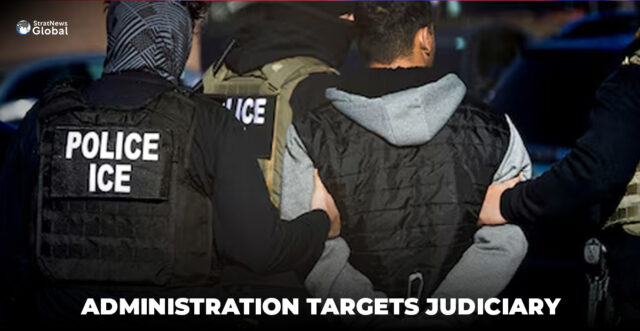The U.S. Department of Justice (DOJ) considered filing criminal charges against Minnesota judges and defence attorneys who discussed holding virtual court hearings to shield defendants from federal immigration arrests, according to five sources familiar with the matter.
In February, FBI agents in Minneapolis opened a preliminary inquiry into whether local judges and defence attorneys obstructed immigration enforcement by requesting virtual hearings, and the concept was also pitched to law enforcement officials in Minneapolis and Washington, D.C., said the people, who spoke on the condition of anonymity to discuss internal Justice Department deliberations.
Reuters could not determine whether the probe is ongoing. To date, no judge or lawyer in Minnesota has been charged over the episode.
Two of the people familiar with the discussions said FBI and Justice Department leadership in Washington supported the probe.
A Justice Department spokesperson declined to comment.
The probe was launched shortly after Emil Bove, the former Acting Deputy Attorney General who has since been nominated by President Donald Trump to serve as an appellate judge for the U.S. Court of Appeals for the Third Circuit, ordered prosecutors in a January 21 memo to pursue potential criminal cases against “state and local actors” for impeding immigration enforcement.
The Senate Judiciary Committee is slated to vote on Bove’s nomination on Thursday, with Democrats expected to oppose it.
The Trump administration has taken aggressive steps against the legal system when its policies have been blocked, lashing out at judges over rulings it disagrees with and seeking to punish law firms and legal organisations that have challenged its policies.
“They’ve been intimidating law firms and lawyers from the beginning,” said Bennett Gershman, a former state prosecutor who teaches law at Pace University. “This is just … part of the campaign to terrorise, intimidate, frighten people from speaking out.”
Email Trail
The Minneapolis probe followed comments made in an email chat maintained by Minnesota defence lawyers on February 6 discussing requesting virtual court hearings for defendants who were living in the U.S. illegally to reduce the risk that Immigration and Customs Enforcement officers would apprehend them at court, the five people told Reuters.
Fox News reported on the existence of the email chat in March, about a month after the Justice Department started its inquiry.
The DOJ probe that the chat helped spark has not been previously reported.
In the email chain, one defense attorney said judges in the Third Judicial District in Minnesota “proactively” reached out to public defenders and prosecutors to encourage them to request Zoom court hearings on any cases with immigration issues, and that such requests would be granted “liberally,” according to an excerpt of the chat verified to Reuters by an attorney who saw the email messages.
In late April, the Justice Department charged Hannah Dugan, a local elected judge in Milwaukee, with trying to help a migrant evade immigration authorities when he appeared in her courtroom for a hearing. The indictment also alleges she told the defendant’s attorney he could “appear by Zoom” for his future court appearances.
Dugan has pleaded not guilty to the charges.
The Justice Department previously tried to charge a local Massachusetts judge in Trump’s first term for helping a state court defendant evade arrest by ICE by allowing him to leave through a rear door.
The case was later dropped during the Biden administration.
Virtual hearings became commonplace in courtrooms across America during the COVID pandemic, and still remain a popular option in some states, including Minnesota.
Chris Wellborn, a recent former president of the National Association of Criminal Defence Lawyers, said that scheduling virtual appearances for clients is a “routine and established procedure” that can help defendants who are balancing multiple jobs or facing child care duties.
“This situation underscores a recurring challenge: the misinterpretation of the vital role a criminal defence attorney plays in upholding constitutional obligations,” he said.
“It is a fundamental duty of all defence lawyers to provide comprehensive advice to their clients regarding all available legal options and pathways.”
(With inputs from Reuters)





